How Are Water Utilities Developing Climate Resilient Water Systems?
Published on by Water Network Research, Official research team of The Water Network in Business
The water industry continues to face increasing regulatory demands, rising energy costs and net zero targets. How are international water utilities managing their operations to drive climate resiliency?
A host of international water utilities at the World Water-Tech Innovation Summit in London will explore how new approaches to smart infrastructure, investment and energy production can strengthen today’s water systems in the face of increased drought and flood events around the globe.
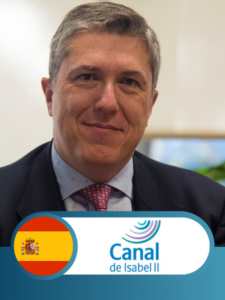 SPAIN: Javier Fernandez Delgado, CTO, CANAL DE ISABEL II
SPAIN: Javier Fernandez Delgado, CTO, CANAL DE ISABEL II
“The increasing and progressively stringent regulation regarding water quality, coupled with the effects of climate change, has a noticeable impact on costs. The approach to this issue must be twofold – firstly, by enhancing efficiency, both in electrical expenditure and water consumption. Secondly, it is practically unavoidable to pass on the cost increase to the tariff.
There are two available paths to reduce costs: the generation of clean energies and its self-consumption, and the adoption of energy-saving policies. In this regard, the advent of artificial intelligence, digital twins, and IoT are the most significant advancements to save costs. On the other hand, the decrease in water availability due to climate change, coupled with population growth, necessitates the establishment of mechanisms to reduce demand, both the unwanted (losses) and the legitimate. The technologies also play a key role in this aspect. The reduction in consumption itself implies a decrease in costs by reducing the amount of water that needs to be treated and distributed, and consequently, the energy required for the process.
Nevertheless, the advent of emerging contaminants and the significant tightening of quality requirements, both for drinking water and wastewater, will lead to an increase in energy expenditure. This increase is challenging to offset with energy efficiency measures and, ultimately will need to be reflected in the tariffs.”
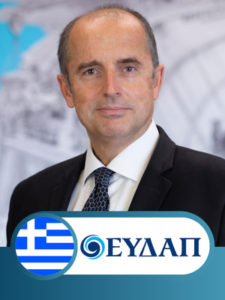 GREECE: Harry Sachinis, CEO, EYDAP
GREECE: Harry Sachinis, CEO, EYDAP
“At EYDAP, our goal is the uninterrupted provision of high-quality water and wastewater services in Athens and the rest of Greece, accessible by everyone, from a model company in Southeast Europe, in terms of ESG and zero carbon water.
In order to achieve the above, we decrease our dependency from energy suppliers through our transition towards zero carbon water, we secure our energy resilience and evaluate new technologies intended for electricity generation from wastewater treatment. We also implement a demanding €2bn investment plan that ensures growth and maintains EYDAP’s position among the world leaders in the water sector. This helps us to invest in smart grid and water supply network replacement to reduce leaks in wastewater pipeline and treatment infrastructure in East Attica, as well as in transformation projects to reduce operational costs and ensure our alignment with the demanding regulatory framework.
It is our duty to safeguard the top notch quality water we provide and to keep our rank as the second least expensive water tariff in the world. We do this by continuously investing in the renewal of our infrastructure, the expansion of new networks, the enhancing of the company’s resilience, the supply and enrichment of our high-quality services throughout Attica and finally, in the development and transfer of our know-how to the rest of Greece.”
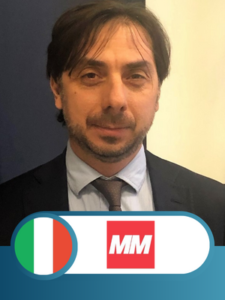 ITALY: Andrea Aliscioni, Director of Integrated Water Service Division, MM SPA
ITALY: Andrea Aliscioni, Director of Integrated Water Service Division, MM SPA
“Regulatory evolution rewards the increase in energy efficiency and self-production of energy. The investments and related management costs are therefore planned on actions aimed at the efficiency of the most energy-intensive components of the water service starting. For example, in Milan from the aqueduct pumping systems through digital monitoring of consumption and pressures through DSS for the pumping scheduling. Self-production of energy must be considered not only in relation to electricity, but above all to the energy exploitation of sewage sludge and heat from water recoverable with heat exchange and pumps.
MALTA: Karl Cilia, CEO, WATER SERVICES CORPORATION
“Water utilities face mounting challenges due to climate change and regulatory demands, necessitating innovative approaches to curb their operational costs. Malta’s progressive decline in rainfall delivered in high-intensity bouts amplifies the stress on water services, calling for more resilient and adaptive systems.
Investing in advanced technology, renewable energy, and leakage management is pivotal in containing costs. With Malta’s increasing dependence on seawater desalination, we continuously invest in state-of-the-art, energy-efficient reverse osmosis (RO) plants. Testimony to this endeavour is WSC’s Energy Globe Award (2023) for a commissioned plant. WSC is also investing in solar farms to increase renewable energy production, with an 80% target increase by 2025. Leakage management is also taken very seriously, with WSC boasting a network ILI (Infrastructure Leakage Index) lower than 1.8.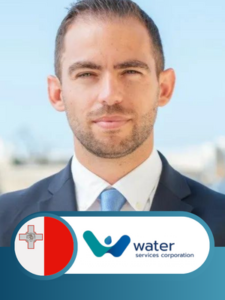
Moreover, we believe in fostering a shift towards sustainable practices and stakeholder collaboration. Wastewater reclamation has become a vital alternative source to groundwater abstraction, as WSC seeks to alleviate climate-induced drought conditions in the agricultural sector. Optimisation of the water reclamation production facilities coupled with adopting sustainable demand management practices keeps the cost of operations in check while providing a climate-decoupled resource for irrigation.”
WSC strongly believes that water management amidst escalating regulations and climate challenges asks for a proactive and holistic approach, which is critical to survival in an ever-evolving environment.”
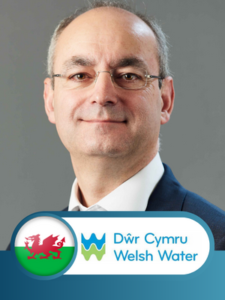 UK: Tony Harrington, Director of Environment, WELSH WATER
UK: Tony Harrington, Director of Environment, WELSH WATER
“Balancing the carbon, resource, societal and economic costs of enhancing and improving our water and wastewater systems, so we can provide a more sustainable service going forward is one of the company’s greatest challenges. We can only move at a pace which is affordable to customers, practical and deliverable in resource terms, and financeable given the borrowing needs of such infrastructure upgrades. As a non-for-profit social enterprise with no shareholders, we have to ensure our customers are supportive of both our priorities and the price rises which will accompany their delivery. Only in this way will we maintain and build the trust of customers and so deliver sustainable long-term services, which protect the interests of future generations whilst meeting the needs of current generations – at a price we can afford.”
We look forward to hearing more from our utility experts on their panel sessions at the summit, book your place now to join them:
Day 1:
Case Studies // Combatting NRW: Smart Systems in Action
Javier Fernandez Delgado, CTO, CANAL DE ISABEL II, SPAIN
Case Studies // Energy Efficiency: Closing the Self-Sufficiency Loop
Harry Sachinis, CEO, EYDAP, GREECE
Fireside Chat // Valorising Side Streams: Resource Recovery Across the Supply Chain
Andrea Aliscioni, Director of Integrated Water Service Division, MM SPA, ITALY
Freshwater Health: Protecting Our Waterways from Contaminants
Tony Harrington, Director of Environment, WELSH WATER, UK
Day 2:
Driving Climate Resiliency with Smart Infrastructure
Karl Cilia, CEO, WATER SERVICES CORPORATION, MALTA
Taxonomy
- Technology
- Technologies
- Water Tech
- Water & Wastewater Technologies Market Expert